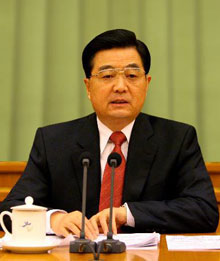Investment overseas and imports a priority
(China Daily/Xinhua)Updated: 2006-12-08 06:44
Quality of growth has been given more emphasis than ever by the central leadership as it mapped out economic guidelines for next year.
The aim is to maintain stable yet rapid economic growth and avoid any big swings in the economy, said a document summing up the deliberations of the three-day Central Economic Work Conference that closed yesterday in Beijing.
 President Hu Jintao speaks at the central economic work conference that ended on December 7, 2006. [Xinhua]  |
For the first time, a better balance in international payments was set as a major goal as leaders pledged to redouble efforts to vigorously expand imports and overseas investment while maintaining rational export growth and use of foreign capital.
The conference is the most important economic forum, held towards the end of each year, to map out development priorities for the next year.
Both President Hu Jintao and Premier Wen Jiabao delivered speeches at the meeting, which was attended by all top officials of the central government.
China's trade surplus reached US$133.62 billion in the first 10 months this year, exceeding the US$101.9 billion for the whole of last year.
Having attracted more foreign investment than any other developing country for the 15th consecutive year, China is estimated to hold about US$1 trillion in foreign exchange reserves.
The growing trade surplus has led to frequent trade friction, while the large international payments surplus has increased the pressure for appreciation of the Chinese currency.
Experts say too much foreign exchange has forced the central bank to issue more renminbi, causing excessive liquidity in domestic financial markets.
The government will continue the strategy of "going global" by encouraging overseas investment, officials said.
China's direct investment overseas was about US$12.3 billion last year, according to the 2006 World Investment Report by the United Nations. But that accounted for only 0.59 per cent of global foreign investment last year, much less than the 4.4 per cent share of global gross domestic product (GDP) and the 6.5 per cent of world trade.
At the conference, Hu told officials that new ideas have been drawn up by the national leadership after it reviewed the experience in the last few years and compared it with the current situation.
To mark the closing of the conference, today's People's Daily carries an editorial urging more balanced development of the economy.
It says the country has made remarkable achievements in the first year of the 11th five-year plan (2006-10), with the economy fulfilling all the targets set by the central government, and as a result, raising general living standards.
However, there are still problems that need to be tackled, most noticeably the relatively weak agricultural sector and the risk of financial fluctuations caused by excessive investment.
There should be a balance between investment and consumption, the domestic and overseas markets, and different segments of overall investment, it says, calling for efforts to expand domestic consumption while reducing trade surplus.
Rural areas, especially the less-developed regions in central and western China, should continue to receive strong support, the newspaper says.
The economic conference embodies a change of emphasis from speed of economic growth to quality, says a news analysis filed by the Xinhua News Agency and posted on the People's Daily website.
It is an implicit signal of moving away from the mode of development that put a lopsided emphasis on speed of growth, the analysis quoted Professor Zhong Wei of Beijing Normal University as saying.
|
||
|
||
|
|